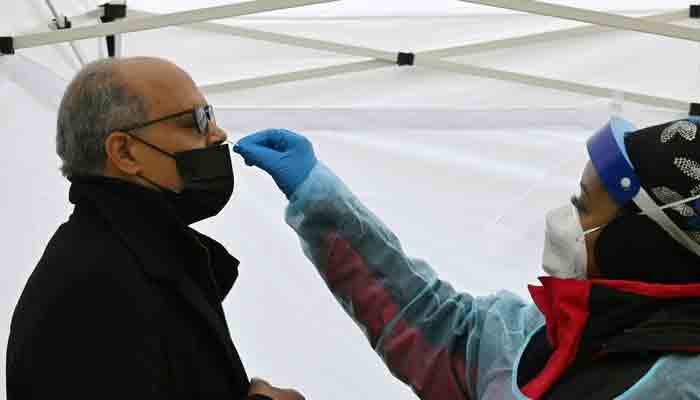WHO warns of Covid ‘tsunami’ as Omicron fuels record surges
US records its highest-ever seven-day average of new coronavirus cases at 265,427
PARIS: A Covid "tsunami" threatens to overwhelm healthcare systems, the WHO said Wednesday, as record surges fuelled by the Omicron variant dampened New Year celebrations around the world once again.
Governments are walking a tightrope between anti-virus restrictions and the need to keep societies and economies open, as the highly transmissible variant drove cases to levels never seen before in the United States, Britain, France and Denmark.
The blistering surge was illustrated by AFP’s tally of 6.55 million new infections reported globally in the week ending Tuesday, the highest the figure has been since the World Health Organization declared a Covid-19 pandemic in March 2020.
"I am highly concerned that Omicron, being more transmissible, circulating at the same time as Delta, is leading to a tsunami of cases," said WHO chief Tedros Adhanom Ghebreyesus.
"This is and will continue to put immense pressure on exhausted health workers, and health systems on the brink of collapse."
Read more: Wearing face mask outdoors is mandatory in Paris
The variant has already started to overwhelm some hospitals in the United States, the hardest-hit nation where the seven-day average of new cases hit 265,427, according to a Johns Hopkins University tracker.
Harvard epidemiologist and immunologist Michael Mina tweeted that the count was likely just the "tip of the iceberg" with the true number likely far higher because of a shortage of tests.
But there was some hope as data indicated a decoupling of the number of cases and hospitalisations.
"We should not become complacent," top US infectious diseases expert Anthony Fauci said Wednesday, but "all indications point to a lesser severity of Omicron".
Read more: Fifth Covid-19 wave may start in mid February, warns NHS
At a drive-through virus testing site in Miami, Florida, on Wednesday, there were long lines of cars with people waiting to provide samples.
"Half of my family has it, you know this new variant is very, very spreadable, like way more spreadable than the first time around," said resident Victoria Sierralta.
"It’s like we’re back in like the first stage of Covid. It’s absolutely crazy."
‘This is serious’
Millions around the world will again welcome a new year in the shadow of the pandemic, which is known to have killed more than 5.4 million people so far, with festivities dampened or cancelled in many countries.
Greece on Wednesday banned music in bars and restaurants to try and limit New Year’s Eve parties, with public events already cancelled.
The mayor of Mexico’s capital has cancelled the city’s massive New Year’s Eve celebrations after a spike in cases.
Despite the outbreak concerns, the streets of Mexico City were busy on Wednesday.
"I don’t think that such an event with such economic importance should be cancelled, however health comes before everything else," said 59-year-old teacher Victor Arturo Madrid Contreras.
With the "cancellation they are sending a message... ‘You know what? This is serious’."
British Prime Minister Boris Johnson meanwhile defended his decision not to clamp down on festivities over the holidays, saying around 90 percent of Covid patients in intensive care had not received a vaccine booster.
The number of people in hospital with the coronavirus topped 10,000 in England, the highest total since March, as Britain on Wednesday reported a new record of 183,037 daily cases.
The high take-up of boosters in England "is allowing us to go ahead with New Year in the cautious way that we are", Johnson said, despite new closures in Northern Ireland, Scotland and Wales.
Records cases in France, Denmark
Across the Channel, France too hit a new daily record of more than 200,000 cases -- more than double the number on Christmas Day -- as it extended its closure of nightclubs into January.
Wearing masks outdoors will become compulsory in Paris on Friday for everyone over the age of 11 except those inside vehicles, cyclists, users of other two-wheelers such as scooters and those participating in sports.
Denmark, which currently has the world’s highest rate of infection per person, recorded a fresh record of 23,228 new cases, which authorities attributed in part to the large numbers of tests carried out after Christmas celebrations.
Portugal also saw a record with nearly 27,000 cases reported in 24 hours.
-
Lewis Capaldi details 'impact of Tourette' on his career
-
Christina Applegate struggles to leave bed amid multiple sclerosis battle
-
Demi Lovato bravely admits she is ‘not ashamed’ of having bipolar disorder
-
Can humans reverse aging? Harvard scientist predict revolutionary breakthrough
-
How Liam Payne’s death impacted awareness about mental health
-
Taylor Swift expresses how negative body comments triggered her
-
Lady Gaga details how eating disorder affected her career: 'I had to stop'
-
Celebrities who struggle with infertility












